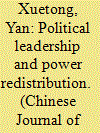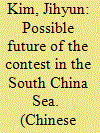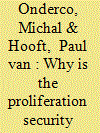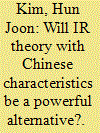|
|
|
Sort Order |
|
|
|
Items / Page
|
|
|
|
|
|
|
| Srl | Item |
| 1 |
ID:
145190


|
|
|
|
|
| Summary/Abstract |
The theoretical puzzle that moral realism must crack is that of why a rising state is able to displace a dominating hegemon even though it is inferior to the latter in terms of economic base, technical invention, education system, military strength, and political system. Moral realism attributes political leadership to the rise or decline of great powers and categorizes political leadership, according to morality, as inactive, conservative, proactive, or aggressive types at national level, and as tyranny, hegemony, and humane authority at international level. Moral realism is a binary theory which suggests that a state’s strength determine strategic interests while types of political leadership determine strategies for achieving those interests. According to moral realist theory it will be possible for China to change the international system in the 21 century if it practices the moral principles of fairness, justice, and civility both at home and abroad.
|
|
|
|
|
|
|
|
|
|
|
|
|
|
|
|
| 2 |
ID:
145191


|
|
|
|
|
| Summary/Abstract |
Since emerging from its century of humiliation, China has repositioned itself as a rising power. China’s great power potential, combined with its latent expansionism and assertive foreign policy behaviour, however, has intensified regional and global security concerns. Among the issues that support the ‘China threat’ theory, that of the South China Sea disputes has become one of the most widely debated security concerns in the region. This study is designed to examine the power game between China and its neighbours which revolves around these disputes. It also looks into the role that the United States plays in managing these regional tensions and the US leadership’s prospects as regards facilitating China’s peaceful rise and transforming this potentially dangerous geopolitical flashpoint into an opportunity to build a more cooperative regional order.
|
|
|
|
|
|
|
|
|
|
|
|
|
|
|
|
| 3 |
ID:
145193


|
|
|
|
|
| Summary/Abstract |
Informal institutions such as the Proliferation Security Initiative (PSI) have increasingly been at the forefront of global efforts to counter proliferation of weapons of mass destruction. Yet a number of countries with strong non-proliferation credentials and incentives to stop likely proliferators have hesitated to join it. We use insights from alliance theory to explain this counterintuitive situation, and frame the decisions of states that are considering joining the PSI as maximizing between security, autonomy, and influence. We argue that while the PSI and similar institutions are comparatively flexible and less rigid in nature, they also exert a lesser constraint on the more powerful states than do international organizations (IO) which reduce uncertainty by freezing the existing hierarchies in place. We then look at a collection of states that vary in their positions on American hegemony, and find that security interests are predominantly decisive among hegemonic and supporter states and nuclear capable states, which are in favour of supporting the PSI, while counter-hegemonic motivations are largely decisive among states that reject the PSI. Consequently, the perceived lack of legitimacy of informal frameworks by states that are sceptical of US hegemony not only undermines the long-term effectiveness of such frameworks, but also reinforces scepticism of US hegemony. The desirability of increasing informalization of security arrangements should therefore be reappraised in the light of systemic stability.
|
|
|
|
|
|
|
|
|
|
|
|
|
|
|
|
| 4 |
ID:
145192


|
|
|
|
|
| Summary/Abstract |
The study of International Relations in China has dramatically increased over the past 30 years. Scholars have now developed a Chinese School(s) of International Relations theory, or at least, International Relations theory with ‘Chinese characteristics’. This recent Chinese move is neither new nor the first attempt, but located within larger efforts to move away from Anglo-Saxon dominance within the International Relations discipline by localizing International Relations theory. From this standpoint, although there seem to be more problems than promises in recent Chinese attempts, we still cannot ignore the great potential of this initiative, first because the pace of change is so fast, second because the number of scholars working on the topic is ever increasing, and last, because the rise of China brings more frequent interactions between Chinese and Western International Relations scholars. All these factors provide extremely fertile ground for any lucky, timely seed of Chinese International Relations theory to germinate, flourish, and proliferate.
|
|
|
|
|
|
|
|
|
|
|
|
|
|
|
|
|
|
|
|
|